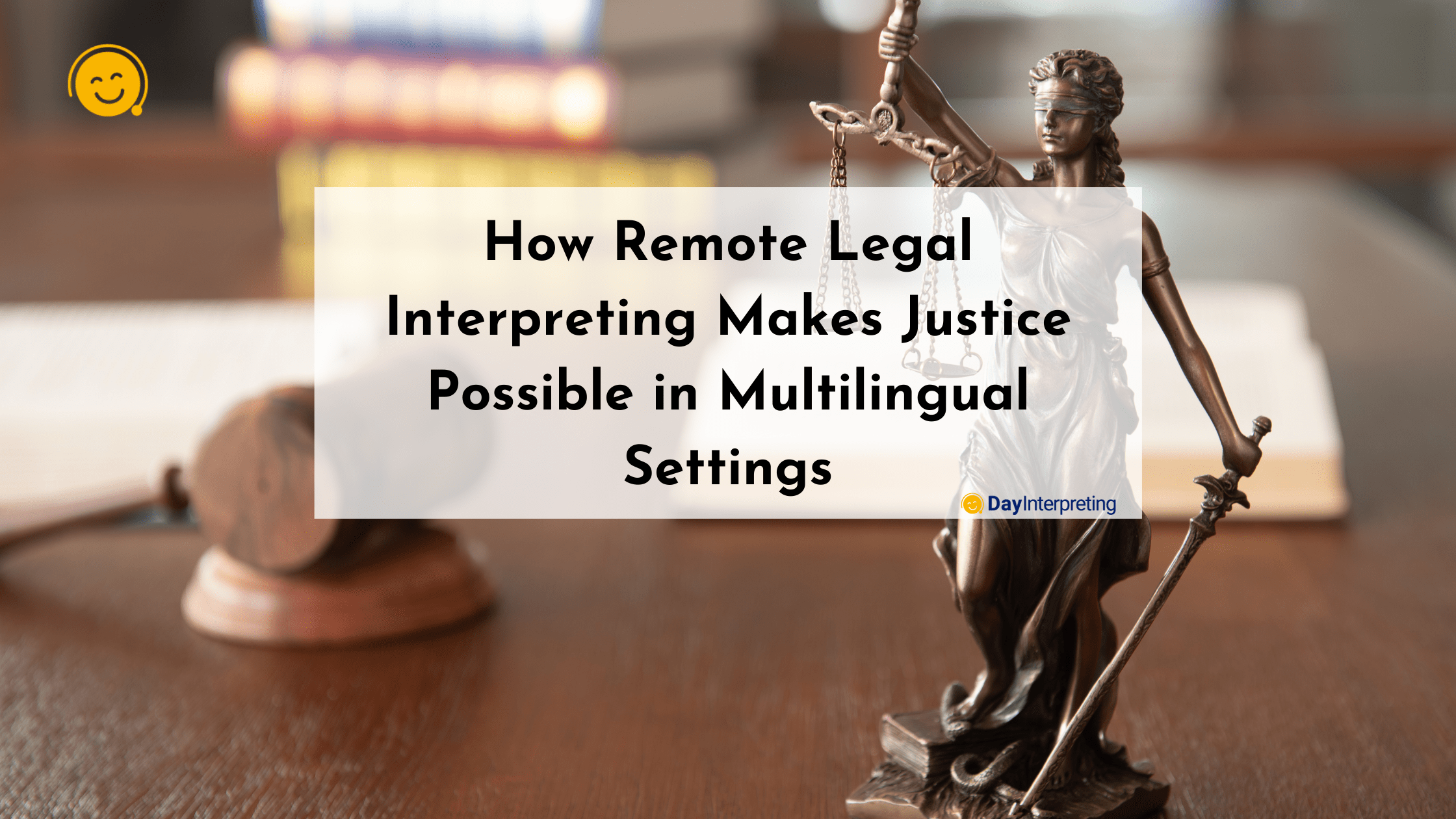Remote legal interpreting services are essential to achieve one of the primary goals of any legal system: ensuring fair and impartial treatment to anyone involved in a legal process.
According to the Vera Justice Institute, there is over 25 million LEP (Limited English Proficiency) citizens in the US today. For multilingual communities across the country and worldwide, ensuring proper communication in legal settings should be a top priority.
The inability of people to make themselves understood deeply hinders the possibility of a fair trial. That’s how remote legal interpreting services enter the picture. But not every interpreter can provide remote legal interpreting services.
The legal sector is filled with specific terminology. And it’s also a very stressful environment that demands seriousness and commitment.
In this post, we’ll explain.
- How legal interpreting works
- What makes excellent legal interpreting services
- How VRI (virtual remote interpreter) is beginning to replace in-person interpreting as the go-to interpreting method in courtrooms in multicultural areas
4 Key Elements that Any Legal Interpreting Services Should Guarantee
Among the most common tasks of legal interpreters, we can pinpoint the following three:
- Interpreting conversations between lawyers and their clients.
- Interpreting during judicial procedures. For instance, when witnesses are multilingual.
- Facilitating communication between LEP people and law enforcement.
Whether simultaneous or consecutive, remote legal interpreting deals with real-time conversations, which forces interpreters to deliver accurate rendering of what’s being said as it’s being said.
While most of their work is inside a courtroom, legal interpreting also takes place in various settings, such as police departments, immigration offices, and even prisons.
The effort of every legal interpreter goes to ensure that people who don’t speak the local language can access justice, making it possible for them to take an active role in the proceedings that involve them.
Therefore, we can understand why a mere interpreter won’t be enough. An interpreter with a deep knowledge of legal terminology will be needed. One who can ensure the strongest impartiality regarding what they are hearing and ensure the confidentiality that this type of delicate context requires. A legal interpreter must guarantee:
- Confidentiality
- Impartiality
- Subject-matter accuracy
- Cultural sensitivity
Confidentiality
A reliable legal interpreter possesses an unbreakable code of ethics, and part of it is maintaining confidentiality. The disclosure of any information about an ongoing trial can severely damage its course, and that is why a legal interpreter is obliged by confidentiality agreements not to disclose nor discuss any information with a third party.
Impartiality
While successful interpreting requires a high level of empathy, the interpreter must maintain complete impartiality to avoid interfering in favor of either party.
Empathy matters since we are talking about contexts in which the LEP person is involved in an environment where they do not understand much of what’s being discussed. This can leave them vulnerable to the subtleties of a legal process. And, while establishing a cordial relationship with the LEP person is essential, we must avoid at all costs that they see the interpreter as an ally just because they speak the same language.
Interpreters are not like attorneys or prosecutors, though they often get compared. Interpreters are more like court reporters; they walk the thin line between both parties, guaranteeing that everything in the target language is understood in the source language and vice versa. That’s why a competent legal interpreter won’t modify anything they hear and will maintain the meaning of what’s being said.
Subject matter expertise
Exceptional skills in the target language won’t suffice. It’s expected that one of the essential characteristics of a legal interpreter is possessing a deep knowledge of legal matters to ensure not only the understanding of the context but an accurate transmission of it. Legal interpreters must understand the ins and outs in legal settings and render specific legal terminology correctly. The best way to ensure this is to rely on subject matter experts.
Not only bilingual but bicultural
This aspect is essential. Why? Legal interpreters meet different people of different social statuses, cultural backgrounds, ages, and literacy competencies. Therefore, within the extensive vocabulary they handle, they must be able to understand colloquialisms or slang specific to the LEP person’s cultural background.
What Video Remote Interpreting Means for Legal Interpreting Services
VRI (video remote interpreting) can be defined as an interpreting service provided through a digital platform. The service facilitates communication through technological tools.
A video remote interpreting platform is most commonly a Zoom-like website or app. It connects users to professional interpreters.
Day Interpreting’s video remote interpreting platform is powered by state-of-the-art infrastructure. It relies on a team of professional interpreters that upholds our commitment to accuracy and sensitivity.
In this section, we’ll look at what video remote interpreting in general is. And more specifically, what Day Interpreting, means for legal interpreting services.
Video Remote Interpreting = As Accurate as In-Person Interpreting
Over-the-phone interpreting (OPI) is not recommended in legal settings. Why? Well, because OPI doesn’t allow an interpreter to see the speakers. This is not the case with virtual remote interpreting. Since every session is essentially a video call, virtual remote interpreters observe non-verbal cues when elucidating a speaker’s statements and intent.
VRI is cost-effective
Hiring an in-person interpreter involves paying for travel expenses and other extra fees. But with VRI services, you only pay for the interpreter’s time and the platform. And you only pay per minute of service. No monthly fees, no maintenance charges.
It’s Secure
This is especially the case with Day Interpreting. Our platforms run on modern, GDPR compliant infrastructure. That way, we guarantee that no malicious third-party can interfere in your session.
And On-Demand!
No contracts, no agreements, no paperwork. VRI is on-demand. Plus, it connects you with an expert interpreter with the click of a button.
Wrapping Up: Day Translations-Level Quality, Day Interpreting-Level Speed
In conclusion: remote legal interpreting is the secret sauce of success for the future. If you need reliable and cost-effective legal interpreting services, look no further! Sign up for a free Day Interpreting account today. It only takes 2 minutes.





0 Comments